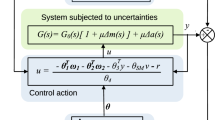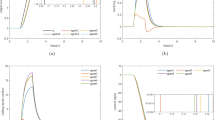Abstract
An adaptive sliding mode control (ASMC) method, based on fractional-order disturbance-observer (FODOB), is presented for a class of fractional-order nonlinear time-delay systems (FONTDS) with uncertainties to solve the target output tracking problem. The external disturbances are estimated by FODOB, and the unknown internal perturbations of the system are adaptively estimated by sliding mode control (SMC). Furthermore, Gronwall’s inequality approach is used to ensure that the output tracking error is uniformly bounded for FONTDS. Firstly, a fractional-order sliding mode control (FOSMC) based FODOB is proposed for a fractional-order linear time-delay system (FOLTDS). Secondly, combined with adaptive estimation, the ASMC of FONTDS is studied. Finally, a numerical example of FONTDS is used to verify the effectiveness of the proposed methods.
Similar content being viewed by others
References
Petráš I. Modeling and numerical analysis of fractional-order Bloch equations. Comput Math Appl, 2011, 61: 341–356
Aguila-Camacho N, Duarte-Mermoud M A, Gallegos J A. Lyapunov functions for fractional order systems. Commun Nonlinear Sci Numer Simul, 2014, 19: 2951–2957
Kilbas A A, Srivastava H M, Trujillo J J. Theory and Applications of Fractional Differential Equations. Amsterdam: Elsevier, 2006
Sabatier J, Agrawal O P, Tenreiro M J A. Advances in Fractional Calculus. Amsterdam: Springer, 2007
Wang Z, Xie Y, Lu J, et al. Stability and bifurcation of a delayed gener-alized fractional-order prey-predator model with interspecific competition. Appl Math Comput, 2019, 347: 360–369
Michail K. Optimised configuration of sensing elements for control and fault tolerance applied to an electro-magnetic suspension system. Dissertation for Doctoral Degree. Loughborough: University of Loughborough, 2009
Wang J, Shao C, Chen Y Q. Fractional order sliding mode control via disturbance observer for a class of fractional order systems with mismatched disturbance. Mechatronics, 2018, 53: 8–19
Podlubny I. Fractional Differential Equations. New York: Academic Press, 1999
Sabatier J, Farges C, Trigeassou J C. Fractional systems state space description: Some wrong ideas and proposed solutions. J Vib Control, 2014, 20: 1076–1084
Dong S L, Fang M, Shi P, et al. Dissipativity-based control for fuzzy systems with asynchronous modes and intermittent measurements. IEEE Trans Cybern, 2019,: 1–11, doi: 10.1109/TCYB.2018.2887060
Dai M C, Huang Z G, Xia J W, et al. Non-fragile extended dissipativity-based state feedback control for 2-D Markov jump delayed systems. Appl Math Comput, 2019, 362: 124571
Hu X H, Xia J W, Wei Y L, et al. Passivity-based state synchronization for semi-Markov jump coupled chaotic neural networks with randomly occurring time delays. Appl Math Comput, 2019, 361: 32–41
Huang X, Fan Y J, Jia J, et al. Quasi-synchronisation of fractional-order memristor-based neural networks with parameter mismatches. IET Control Theor A, 2017, 8: 2317–2327
Li X M, Zhang B, Li P, et al. Finite-horizon H state estimation for periodic neural networks over fading channels. IEEE Trans Neural Netw Learning Syst, 2019, 1–11, doi: 10.1109/TNNLS.2019.2920368
Wang X H, Wang Z, Song Q K, et al. A waiting-time-based eventtriggered scheme for stabilization of complex-valued neural networks. Neural Networks, 2020, 121: 329–338
Jia J, Huang X, Li Y, et al. Global stabilization of fractional-order memristor-based neural networks with time delay. IEEE Trans Neural Netw Learning Syst, 2019, 1–13, doi: 10.1109/TNNLS.2019.2915353
Li X M, Zhou Q, Li P, et al. Event-triggered consensus control for multi-agent systems against false data-injection attacks. IEEE Trans Cybern, 2019,: 1–11, doi: 10.1109/TCYB.2019.2937951
Cao L, Li H Y, Dong G W, et al. Event-triggered control for multiagent systems with sensor faults and input saturation. IEEE Trans Syst Man Cybern Syst, 2019, 1–12, doi: 10.1109/TSMC.2019.2938216
Dong S L, Chen C L P, Fang M, et al. Dissipativity-based asynchronous fuzzy sliding mode control for T-S fuzzy hidden Markov jump systems. IEEE Trans Cybern, 2019, 1–11
Meng B, Wang X, Wang Z. Synthesis of sliding mode control for a class of uncertain singular fractional-order systems-based restricted equivalent. IEEE Access, 2019, 7: 96191–96197
Meng B, Wang X H, Zhang Z Y, et al. Necessary and sufficient conditions for normalization and sliding mode control of singular fractional-order systems with uncertainties. Sci China Inf Sci, 2019, doi: 10.1007/s11432-019-1521-5
Utkin V I. Sliding Modes in Control and Optimization. Berlin: Springer, 1992
Shao S Y, Chen M, Yan X H. Adaptive sliding mode synchronization for a class of fractional-order chaotic systems with disturbance. Nonlinear Dyn, 2016, 83: 1855–1866
Guo J H, Luo Y G, Li K Q. Adaptive fuzzy sliding mode control for coordinated longitudinal and lateral motions of multiple autonomous vehicles in a platoon. Sci China Tech Sci, 2017, 60: 576–586
Ciccarella G, Dalla Mora M, Germani A. A Luenberger-like observer for nonlinear systems. Int J Control, 1993, 57: 537–556
Su J Y, Chen W H. Further results on “Reduced order disturbance observer for discrete-time linear systems”. Automatica, 2018, 93: 550–553
Yang H J, Liu J K, He W. Distributed disturbance-observer-based vibration control for a flexible-link manipulator with output constraints. Sci China Tech Sci, 2018, 61: 1528–1536
Vahidi-Moghaddam A, Rajaei A, Ayati M. Disturbance-observer-based fuzzy terminal sliding mode control for MIMO uncertain nonlinear systems. Appl Math Model, 2019, 70: 109–127
Wei X J, Wu Z J, Karimi H R. Disturbance observer-based disturbance attenuation control for a class of stochastic systems. Automatica, 2016, 63: 21–25
Zhang J H, Shi P, Lin W G. Extended sliding mode observer based control for Markovian jump linear systems with disturbances. Automatica, 2016, 70: 140–147
Chen M, Chen W H. Sliding mode control for a class of uncertain nonlinear system based on disturbance observer. Int J Adapt Control Signal Process, 2010, 24: 51–64
Zhang J H, Liu X W, Xia Y Q, et al. Disturbance observer-based integral sliding-mode control for systems with mismatched disturbances. IEEE Trans Ind Electron, 2016, 63: 7040–7048
Pashaei S, Badamchizadeh M. A new fractional-order sliding mode controller via a nonlinear disturbance observer for a class of dynamical systems with mismatched disturbances. ISA Trans, 2016, 63: 39–48
Lu M B, Liu L, Feng G. Adaptive tracking control of uncertain Euler-Lagrange systems subject to external disturbances. Automatica, 2019, 104: 207–219
Sun G H, Wu L G, Kuang Z A, et al. Practical tracking control of linear motor via fractional-order sliding mode. Automatica, 2018, 94: 221–235
Li H, Zhao S, He W, et al. Adaptive finite-time tracking control of full state constrained nonlinear systems with dead-zone. Automatica, 2019, 100: 99–107
Gong P, Lan W. Adaptive robust tracking control for uncertain nonlinear fractional-order multi-agent systems with directed topologies. Automatica, 2018, 92: 92–99
Min H F, Xu S Y, Zhang B Y, et al. Output-feedback control for stochastic nonlinear systems subject to input saturation and timevarying delay. IEEE Trans Automat Contr, 2019, 64: 359–364
Wu Z G, Xu Y, Pan Y J, et al. Event-triggered pinning control for consensus of multiagent systems with quantized information. IEEE Trans Syst Man Cybern Syst, 2018, 48: 1929–1938
Author information
Authors and Affiliations
Corresponding author
Additional information
This work was supported by the National Natural Science Foundation of China (Grant Nos. 61573008 and 61973199) and the Post-Doctoral Applied Research Projects of Qingdao (Grant No. 2015122).
Rights and permissions
About this article
Cite this article
Wang, Z., Wang, X., Xia, J. et al. Adaptive sliding mode output tracking control based-FODOB for a class of uncertain fractional-order nonlinear time-delayed systems. Sci. China Technol. Sci. 63, 1854–1862 (2020). https://doi.org/10.1007/s11431-019-1476-4
Received:
Accepted:
Published:
Issue Date:
DOI: https://doi.org/10.1007/s11431-019-1476-4




